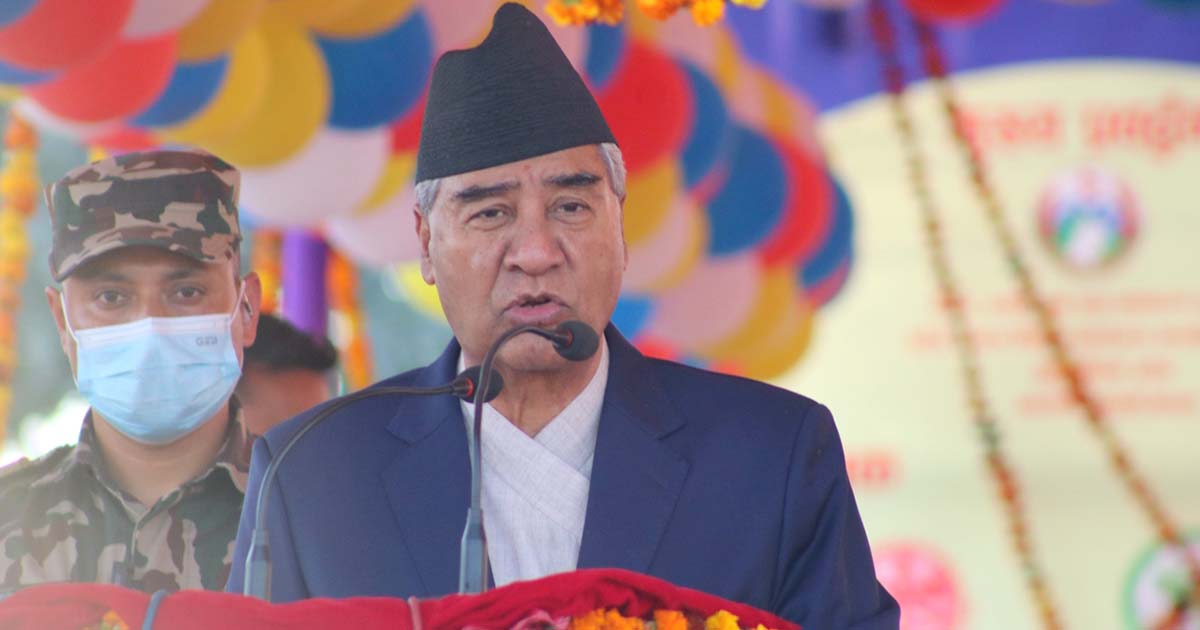Deuba, Thapa file nominations for Parliamentary Party leader
Nepali Congress President Sher Bahadur Deuba and party General Secretary Gagan Thapa have filed their nominations for the Parliamentary Party leader.
Senior leader Ram Chandra Paudel proposed Deuba’s nomination and Vice-President Purana Bahadur Khadka seconded the proposal.
 Similarly, Shekhar Koirala proposed Thapa’s nomination and Dhanraj Gurung and Bishwo Prakash Sharma seconded the proposal.
The election to choose the Parliamentary Party leader will be held on Wednesday.
The voting will begin at 8 am and end at 10 am tomorrow at the party’s Parliamentary Party office in Singhadurbar.
Similarly, Shekhar Koirala proposed Thapa’s nomination and Dhanraj Gurung and Bishwo Prakash Sharma seconded the proposal.
The election to choose the Parliamentary Party leader will be held on Wednesday.
The voting will begin at 8 am and end at 10 am tomorrow at the party’s Parliamentary Party office in Singhadurbar.
Gagan is my candidate for Parliamentary Party leader: Shekhar Koirala
Nepali Congress leader Shekhar Koirala said that he proposed Gagan Thapa as the candidate of the Parliamentary Party as per the wishes of the young generation. During a meeting held on Tuesday, Koirala said that he proposed Thapa as the candidate of the Parliamentary Party leader as he is in favor of generational transformation. Leader Koirala made it clear that Thapa is his candidate. “Gagan is dynamic. Youths also want him to be the Parliamentary Party leader. I proposed him as the candidate of the Parliamentary Party leader as I am in favor of party transformation,” he said. NC central member Ajay Babu Shivakoti said that the meeting has decided to field General Secretary Thapa as the candidate of the Parliamentary Party leader. Meanwhile, party President Sher Bahadur Deuba is preparing filed candidacy for the post of Parliamentary Party leader from the establishment faction.
UML Vice-Chairman Nembang formally proposes Dahal to become prime minister
CPN (Maoist Center) Chairman Pushpa Kamal Dahal and CPN-UML Vice-Chairman and former Speaker Subash Chandra Nembang held a meeting on Tuesday to discuss a new power sharing. Nembang reached Khumaltar this morning and formally proposed Dahal to become the prime minister. During the meeting, the duo discussed a new power sharing, government formation and contemporary political issues. Vice-Chairman Nembang stressed that the left parties should come to the same place. He was of the opinion that the UML-Maoist Center government should be formed by splitting the ruling coalition. “Let the Maoist Center be ready to leave the alliance and cooperate with the UML. The UML is ready to accept you as the prime minister,” a leader said, quoting the dialogue of the two leaders. “Other posts will be shared in consensus among the senior leaders of the UML-Maoist Center.” “Leave the alliance now, UML is ready to hold discussion and cooperate with the Maoist Center. Let’s take politics ahead through a new course to take the country towards the path of stability,” the leader said. Nembang proposed a new power sharing deal with Dahal and not to include the CPN (Unified Socialist) in the government for now. “The UML is not ready to bring the CPN (Unified Socialist) in the new government. Let’s make a coalition without the CPN (US),” he said. The UML intensified meetings with senior leaders after President Bidya Devi Bhandari called on the political parties to form a new government within December 25. Earlier, CPN (Maoist Center) General Secretary Dev Prasad Gurung had held a meeting with UML Chairman KP Sharma Oli at the latter’s residence in Baluwatar. Nepali Congress President Sher Bahadur Deuba and Dahal have been staking claim for the post of prime minister within the ruling coalition. Though Deuba had promised Dahal before the elections that he will make him the prime minister of a new government, no formal discussions have been made about the power sharing and future prime minister yet. Utilizing this opportunity, the UML has been trying to break the coalition and form its new alliance. UML leader Bishal Bhattarai had announced that the UML would move ahead if the ruling coalition failed to garner a majority. The Maoist Center has been bargaining power with the UML and the Nepali Congress parallelly. Earlier, the ruling coalition parties had decided to give continuity to the incumbent alliance. The Maoist Center, a key partner of the alliance, however, has been holding intensive talks with the UML in recent times. Second rung leaders of the UML and the Maoist Center have been mounting pressure on the Chairman duo Oli and Dahal to move forward together.
RPP not in hurry to join government: Lingden
Rastriya Prajantra Party (RPP) Chairman Rajendra Lingden has said that his party is not in a hurry to join the government. He said so during a program organized to welcome and congratulate the newly elected lawmakers from RPP. He, however, said that the RPP has not vowed to stay away from the government either. The Party's agenda and values would be set gradually and it would take decisions on time, Lingden added. Lingden claimed that his party had taken a right track from the election. He was also of the view that the RPP could not collect the votes as per its expectation due to the failure to mobilize the party effectively. However, it won people's trust. The Chairperson also made it clear that new persons having capacity and potential were made the lawmakers. On the occasion, RPP leader Pashupati Shumsher JB Rana suggested the newly elected members of the House of Representatives from the party to be watchful on the old parties and government activities. Parliament should be utilized as a platform to show capacity, he said.



















